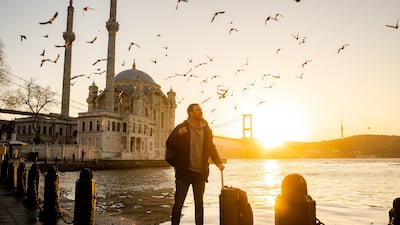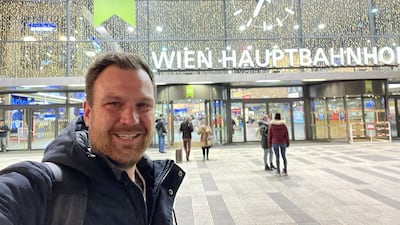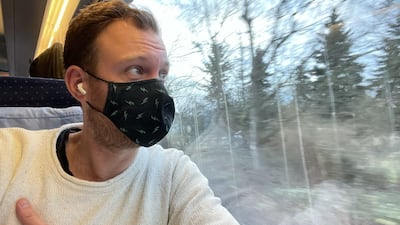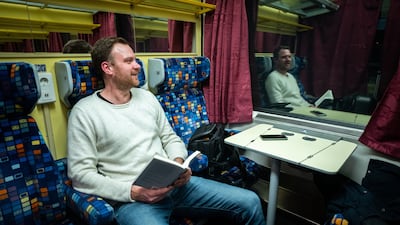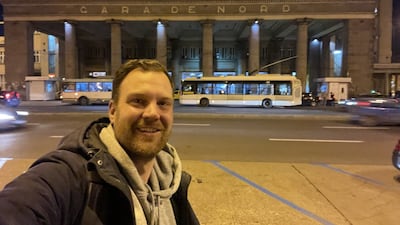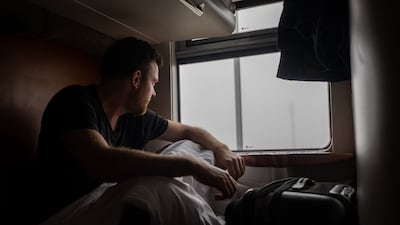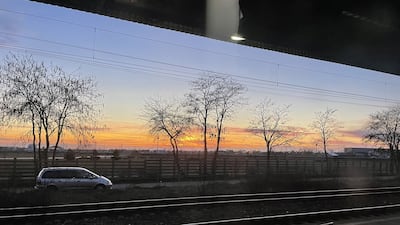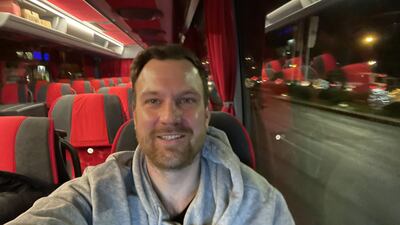A trip from Amsterdam to Dubai becomes slightly more challenging during a global pandemic – but when you remove the option of flying it becomes an epic adventure of Phileas Fogg proportions.
Dutchman Wiebe Wakker is a self-styled sustainable adventurer and has form in promoting eco-tourism.
eco-adventurer
Three years ago he completed a 100,000 kilometre journey from Holland to Australia, crossing 34 countries in 1,222 days without using a single drop of fuel.
Mr Wakker’s journey was powered by an electric vehicle – a four-door estate named the Blue Bandit – and was scheduled to speak about his experiences at the Dutch Pavilion at Expo 2020 Dubai on January 20.
That event has since been cancelled, but he will continue his journey to the UAE with a speaking event planned at the World Future Energy Summit in Abu Dhabi on January 18.
He hopes to inspire others and encourage more use of sustainable transport.
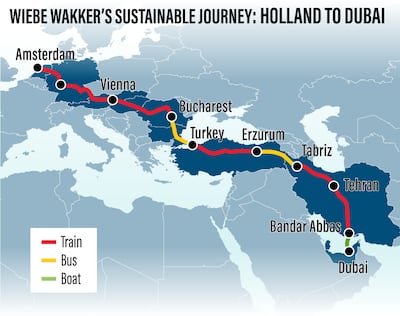
“I relied on the generosity of strangers to help with food and recharging my vehicle on my journey to Australia, and I blogged about my journey over three years or so,” said Mr Wakker, 35, who is single and began his adventures after graduating from the Utrecht University of Arts.
“Now in my life, I try to live with a low carbon footprint, particularly with travelling.
“I wanted to make this trip to Dubai to show what can be done and reduce my footprint.
“It would not have made sense to fly to the UAE to make a speech on sustainable mobility.”
Journey to Dubai
Starting in Amsterdam in his home country, Mr Wakker has so far travelled by train through Europe, stopping at Vienna and Bucharest en route to Istanbul.
He will then make his way by rail to Erzurum in Turkey before entering Iran, heading for Tabriz.
His journey will take him on to Tehran before travelling across Iran to the port of Bandar Abbas, where he plans to take a ferry to the UAE.
Thousands of people supported Mr Wakker on his journey to Australia, by offering charging points for his vehicle, accommodation and food.
The Dutchman has been tweeting about his journey with updates of his progress, in exchange for cheats and tips along the way from his social media followers.
According to his calculations, the journey over land and sea will emit less than half the carbon emissions of flying – about 450 kilograms of CO2 compared with about 1,100kg if he had flown.
The journey will traverse nine countries, and he plans to arrive in Dubai on January 12.
“I understand it is not an efficient way of travelling, with 10 days there and 10 days back for one speech, but it is more of a symbolic gesture to show the impact on the climate for travelling,” Mr Wakker said.
“Hopefully I can show that you don’t have to fly to enjoy new adventures.
“I am wearing my mask all the time, but in some cities, like Istanbul, few people are wearing them.
“The worst thing for me now would be to catch Covid.”
Highlights so far have been stunning scenery in Transylvania as he railed through Romania and the food of Istanbul.
But going without food for 20 hours on one leg of the journey and a 10-hour bus trip into Bulgaria and Turkey were rare low points.
Travel costs for the trip will be about €370 ($418) for all trains, buses and ferry crossings.
The further east he has travelled the cheaper travel has become with a 1,500km, 22-hour train ride across Turkey costing less than €4.
Most nights will be spent on trains in sleeper cabins, with just three spent in hostels or hotels when he is unable to travel overnight.
The borders with Iran are closed because of the pandemic but are due to re-open on January 9.
Any delays and his plans will be amended – travel from Turkey to Kurdish Iraq, and then to Erbil and into Jordan and on to Saudi Arabia.
“To enter Iran and the UAE I need to provide negative PCR tests so I need to be careful,” Mr Wakker said.
“The train from Budapest to Bucharest was amazing with a beautiful landscape.
“To watch the scenery change gradually with the culture is the best part of slow travel like this.
“Hopefully my journey can inspire others to think of more sustainable travel.”
